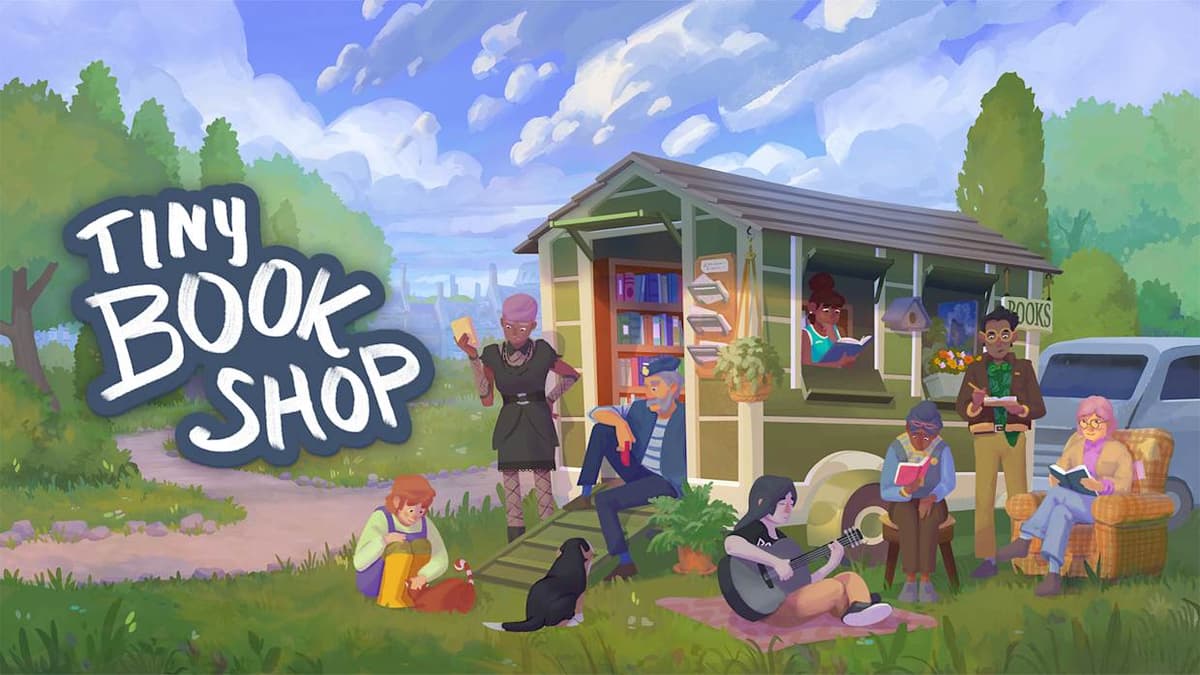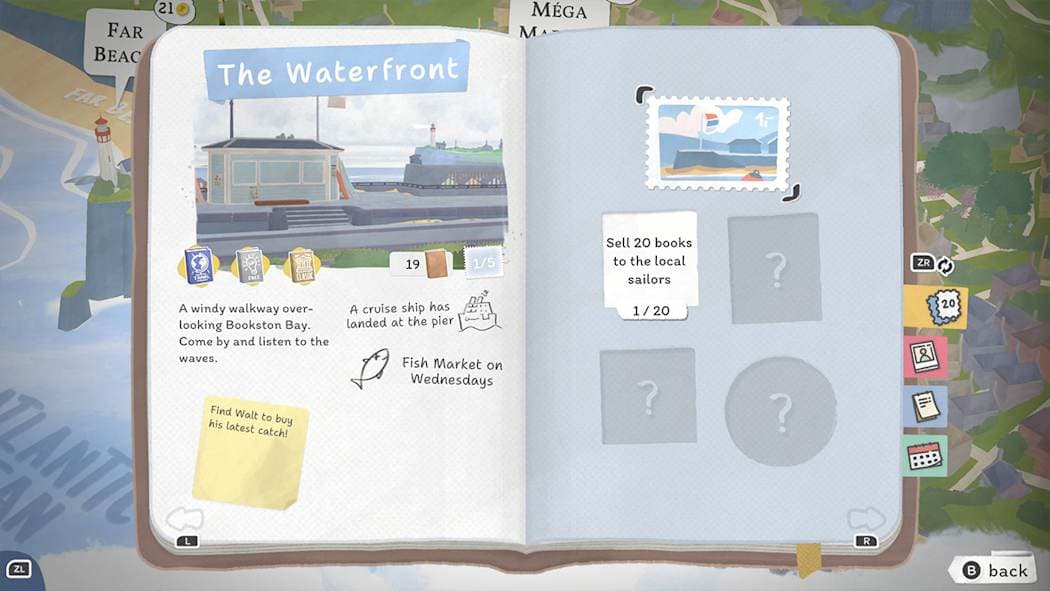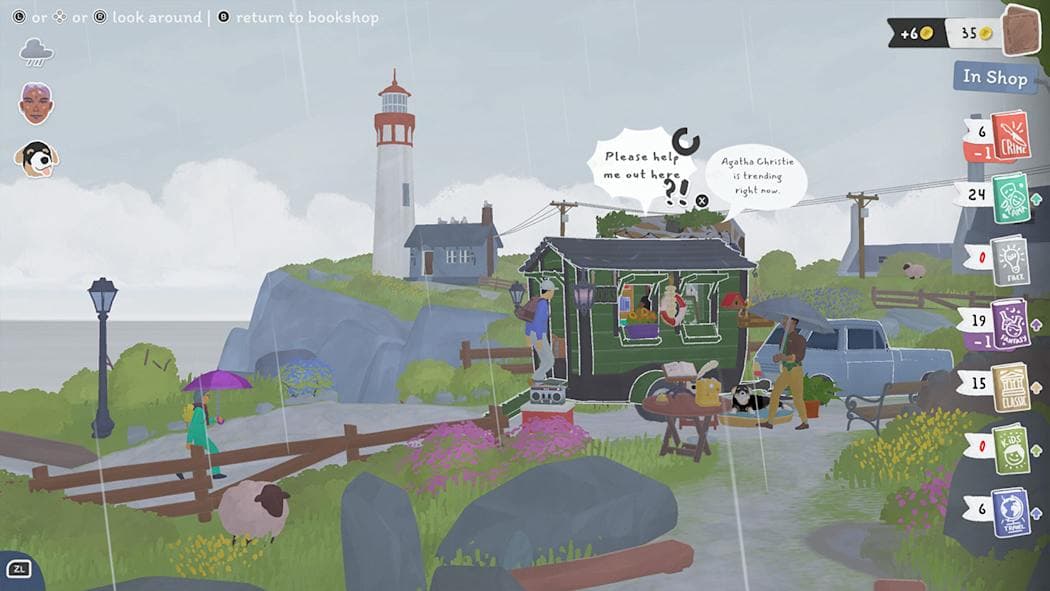
Game intel
Tiny Bookshop
Leave everything behind and open a Tiny Bookshop by the sea in this ambient narrative management game. Stock your wagon, set up shop in scenic locations, and n…
I’ve had the same daydream as a lot of bookish people: quit everything, buy a little cart, and sell paperbacks to friendly locals who still know the name of their librarian. Tiny Bookshop leans hard into that fantasy. It whisks you to Bouquainville, a sunlit little town where your mobile bookstore can pop up next to the supermarket one day and the university the next, catching breezes and conversations as if rent and wholesalers don’t exist. After just over six hours on the Steam version (mouse and keyboard on a desktop PC), I felt warmth and satisfaction… and then, like a bookmark slipping out, that gnawing sense of repetition.
My first 90 minutes were pure cozy bliss. The game greeted me with a soft color palette and easygoing music, then tossed me into a tiny but surprisingly flexible loop: pick tomorrow’s location on a paper map of Bouquainville, stock the cart, place a few cute decorations for small bonuses, open shop, and recommend books when customers ask for something specific. It’s not about spreadsheets so much as vibes and gentle curation-and I mean that as a compliment. I settled into the role quickly, and by the end of that first session I was unconsciously humming along as the cart’s little bell jingled for the lunch crowd.
The first morning I parked by the supermarket with a shelf obsessed with crime and thrillers. It felt like the right call; the game telegraphs what each location’s crowd prefers-supermarket folks devour mysteries, while the university wants classics and non-fiction. Sales were brisk, and within half an hour I was doing what the game does best: mini-recommendation puzzles. A woman asked for “a love story with a happy ending.” My brain reflexively grabbed Romeo & Juliet (nostalgia is powerful), and then I remembered: not a novel, and definitely not a happy ending. I scrolled through my stock, skimmed the one-paragraph summaries the game provides, and found a cheerful contemporary romance at the perfect page count. Sold. She left smiling. I smiled too.
By day three, the cart started to feel like mine. I hung a string of bunting, added a plant, and stuck a little sign I’d found ontop of the shelf. Decorations aren’t just set dressing-each one can buff certain genres or subtle stats. It’s light-touch strategy but it does change how you approach the day. Heading to campus? Swap the cozy lighting for something that flatters the classics. Spending the evening near the park? Lean into poetry and short stories. The game never drowns you in numbers; it nudges you with gentle cause and effect.
Somewhere around the end of the first week, I adopted a stray dog. You don’t have to, but you’d be a monster not to acknowledge the little guy. He’s a presence more than a system—another reminder that Tiny Bookshop is less about margins and more about community. The town’s regulars started to recognize me, too. There’s a grandmother who cares a little too much about old editions, a teacher drumming up a fundraiser for kids, a few locals whose small dramas play out between purchases. It’s personable without turning into a full visual novel.
Here’s the detail that shaped most of my experience: you don’t buy individual titles to stock; you buy in bulk by genre. That simplification is smart for a cozy game—it keeps you out of spreadsheets and inside the conversation. Each day you get one shelf (roughly 40 books) to fill, so picking the right mix really matters. Roll into the university with too many romances and you’ll be overstocked when non-fiction requests surge. Show up at the supermarket with a shelf full of poetry and you’d better hope you’ve got a lot of dog-lovers looking for gifts.
When customers ask for recommendations, they don’t always spell out an exact title. Sometimes they’re precise (“I want a classic under 200 pages”), sometimes they’re hazy (“Something adventurous, but not scary”). The game turns that into a little riddle: read their hint, check your shelf, skim the short summaries and metadata every book displays—genre, year, page count, author—and pick something that fits. If you’ve stocked well, there are usually multiple right answers. I enjoyed this part a lot. It scratches the bookseller itch without requiring a literature degree. And that first time a regular came back saying they loved the pick I made? I’ll be honest, it made me stupidly happy.

There is a flip side, though. Because you stock by genre and not by specific title, you can’t surgically curate the exact book you want to put face-out. The summaries are there, and you can read them when recommending, but you don’t choose individual items at the stocking phase. That means the pleasure of “I’m putting these five favorites on the front table because I know Clara is coming back” isn’t really here. It’s curation by broad strokes rather than handpicked taste. For a game that celebrates the romance of indie bookselling, that limit does take a little wind out of the sails.
After about four hours—right as the calendar tipped past that first golden summer into the crisp edge of autumn—the loop began to repeat. Not catastrophically, not all at once, but it crept in. The same regulars, with the same requests. The same style of riddles, often asking for the same kind of book. There’s a grandmother who challenged me on collectibles more than once, and the second time was charming; the fourth time was déjà vu. And while a new location unlocked with the season change (nice), it didn’t significantly alter how I played or how customers behaved.
To be clear: the breadth of books is decent. I kept seeing a healthy mix of classics, contemporary titles, non-fiction categories, and niche genres. But the precise recommendation prompts don’t scale in variety as fast as you’ll want. I started bumping into repeated puzzles within hours. There’s a cozy rhythm to that if you treat the game like a daily ritual—a cup-of-tea, 15-minute session before bed. Played in longer sittings, the repetition is harder to ignore.
The other soft spot is capacity. The one-shelf rule gives decisions weight, but it also caps the fantasy in an odd way. I constantly wanted a “front table” slot to stage a couple of handpicked oddballs, or a small corner for staff picks. Tiny Bookshop is all about gentle constraints, and I respect that, but when the core fantasy is curation, an extra inch of space—or a more granular stocking step—would go a long way. I also wished I could place specific titles for display to better answer those trickier riddles that mention page count and era; having to trust the genre bulk order to include what I needed sometimes felt like crossing my fingers at the register.
Even after the loop flattened, a few moments kept me invested. The first time I nailed three back-to-back recommendations for different age groups—kid, teen, adult—pure fist pump. Stocking by gut and watching the cart empty just the way I hoped? Satisfying. And there’s a sweetness to the town itself that never left me. People greet you, you spot hidden knickknacks in the background, a side task pops for raising funds, someone confides in you about why they’re reading what they’re reading. It’s a small-town fantasy that doesn’t try to surprise you with a twist; it simply wants you to feel welcome.

One night stands out: I moved the cart near the university for an evening crowd and gambled on stacking non-fiction—biographies, essays, history—at the expense of my usual romance anchor. The shift changed the cadence of conversation. Instead of “I want something light for a commute,” I started hearing “I’m looking for a powerful life story under 250 pages.” I found myself comparing author bios, glancing at publication years, and choosing between two possible fits. That micro-tension, resolved by reading the little blurbs and thinking like a real bookseller, is the soul of this game at its best.
On PC, the game ran flawlessly for me. No crashes, no hitches, and quick loads between days. It’s a light 2D presentation with clean typography and high contrast, which helps when you’re scanning summaries and metadata over and over. I played entirely with mouse and keyboard; it feels designed for pointing and clicking, and dragging decor onto the cart is snappy. The daily planning screen—map, location buffs, weather hints—was readable and quick to parse after a day or two. The one small gripe: occasionally I misclicked a customer while moving between the shelf and the till during a rush, but that’s more on my caffeine intake than the UI.
Audio-wise, it’s understated. Relaxing tracks you won’t be humming for years, but they do the job of smoothing out the edges of a busy game day. The “cart open” ambient layer is tasteful: the soft bell, the waves of chatter, the gentle swish of pages. It all increases the sense that you’re performing a ritual rather than grinding a system.
If you crave a cozy management sim that respects your time and doesn’t punish missteps, Tiny Bookshop is an easy recommendation—especially if you’re the kind of player who prefers 20-30 minute sessions over marathons. There’s enough to think about in the stocking and recommendation puzzles to make you feel clever without turning your free time into homework. The decor system gives you tiny edges without freezing you in decision paralysis. And the town’s regulars, even if they repeat themselves, provide a welcoming rhythm that makes Bouquainville feel lived-in.
If, that said, your favorite management games are the ones that spiral into spreadsheets—if you loved min-maxing the supply chain in Factorio or obsessing over customer segments in deeper tycoon games—this is going to feel like a sandbox with carefully rounded corners. Likewise, if you’re here for branching visual-novel-level storytelling, you might find the character beats pleasant but thin. Tiny Bookshop is content to be a comforting routine. It’s more Dorfromantik than Cities: Skylines; more Coffee Talk energy than a full-blown bookstore sim.
Three tweaks would push this from “charming” to “compelling.” First, let me handpick a handful of titles at stocking time, even if most of the shelf remains genre bulk. Two or three “staff picks” slots would elevate the curation fantasy and make recommendation riddles sparkle. Secondly, widen the pool of customer puzzles and make them react to who I am stocking for—repeat customers should evolve, not reset. Finally, consider a second shelf or a rotating endcap as you progress. The single-shelf constraint is elegant early on but contributes to the late-game flatness.

Those wishes come from a place of affection. I didn’t want to leave the cart. I just wanted more reasons to fuss over it.
By the time autumn rolled around in Bouquainville, I knew Tiny Bookshop had already shown me most of its tricks. That realization didn’t sour the experience; it just reframed how I played. Instead of long sessions, I settled into bite-sized visits—open for a day, make a few recommendations, rearrange a plant, and log off smiling. As a cozy management “doudou” (security blanket), it absolutely works. As a deep or endlessly varied sim, it doesn’t. The game is honest about which side it’s on, and once I accepted that, I enjoyed it more.
The fantasy of independent bookselling has a gravitational pull, and Tiny Bookshop understands why: the people, the serendipity, the quiet moments where the right book finds the right hands. When it all clicks—the location matches your stock, the decoration buffs tip things in your favor, and a regular beams at your pick—you feel like the heart of a small town. When you’ve heard the same request for the third time and your single shelf can’t flex to make the day feel different, you feel the seams.
Still, I kept coming back for “just one more day,” and that says a lot. I think the game will be at its best for players who treat it like a ritual. Brew something warm, pick a corner of Bouquainville, and sell what makes your neighbors happy. Close the cart before the loop feels stale, and the magic stays.
Rating: 7/10
Verdict: A warmly written, lightly strategic cozy sim that nails the feeling of community and curation in the moment-to-moment but runs out of fresh pages after a season. Best enjoyed in small daily doses with a cup of tea and no pressure.
Get access to exclusive strategies, hidden tips, and pro-level insights that we don't share publicly.
Ultimate Reviews Strategy Guide + Weekly Pro Tips